by Joanne Ivancic* (Advanced Biofuels USA) Beginning the new year with a few days steeped in agriculture proved a great winter tonic, raising optimism that the seemingly ordinary people tromping through the York County Fair buildings at the Keystone Farm Show ("A farm show for farmers") hold the keys to transitioning to a truly renewable, sustainable energy future--and they intend to use them thoughtfully and wisely. And, if given half a chance, they will improve the economic well-being of this country and the world.
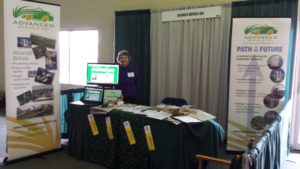 Peggy Alpert staffing the Advanced Biofuels USA booth at the Keystone Farm Show
Peggy Alpert staffing the Advanced Biofuels USA booth at the Keystone Farm Show
Not that anyone actually said this in so many words. Sometimes it took some effort to pull out of the people stopping by the Advanced Biofuels USA booth their stories about their experiences with biofuels and their appreciation of the role of renewable, regenerative feedstocks in powering the future.
Veterans for Biofuels
A couple of Vietnam Veterans, talking with us hours apart, expressed similar motivations for their deep belief in the value of renewable fuel. The first has been making his own biodiesel from used cooking oil for 10 years, powering an old VW van, other vehicles and farm equipment with 100% renewable fuel through the summer months, tapering off during the winter due to gelling.
We began by talking about his experiences with home-made biodiesel, not uncommon in this mid-Atlantic region where commercial biodiesel seems hard to come by. Over the years he has refined his technique, learned a lot about managing variations in quality of UCO, depending on the source. He's happy to have cemented a relationship with a local restaurant that gives him high quality feedstock.
I found out about his military service only when talking about the value of renewable fuels not only for close-to-home environmental and economic reasons; but also for giving a country less cause to be fighting for petroleum resources. We talked about current presidential candidates' promises to get more troops involved in the Middle East, how that would necessitate a draft of not only boys this time, but girls, too. He then talked about being drafted and his deep concern that we are heading that way again, unnecessarily. And wondered at leaders who cannot get us away from sending our energy payments away from our own economies to support economies of those we are fighting.
And, he finished, that is why he uses as much home-grown fuel as possible. To keep from sending his money to people we are fighting and who may be killing the next generation of draftees.
You can have some pretty intense conversations at a farm show.
The other Vietnam vet, I eventually discovered, had been awarded two purple hearts. We talked generally about the promise of renewable fuels. Being in a building with lots of dairy-related exhibitors, we talked about anaerobic digesters as well as ethanol, renewable jet fuel, renewable diesel and biodiesel. People related a wide variety of good and bad experiences to us at these events. Generally, he expressed optimism about overcoming any weaknesses in our renewable energy systems.
These vets may be living very different lives, may have expressed different opinions about some values; but they both talked about the importance of agricultural practices that have more value than just the immediate economic effects. Keeping our energy money circulating in this country, not paying it (directly or indirectly) to people fighting against our military--that is a core motivation to make and use renewable fuels deeply felt by both of these men.
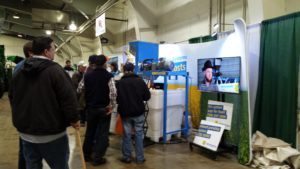 Keystone Farm Show exhibit area
Keystone Farm Show exhibit area
Anaerobic Digesters
Many with whom we spoke were quite familiar with anaerobic digesters, especially as a means of nutrient management of dairy manure. This part of the country has a significant dairy industry, so anaerobic digesters provided a conversational opening to talking about other biofuels. There were many nodding heads as I mentioned the ability to get EPA credit for the methane from digesters that enters the transportation fuel market.
We talked about using food waste as digester feedstock and one woman who had been at the edge of the conversation circle, as the group was leaving, made a point to share with us that she has a home-scale digester for food and farm waste that provides enough gas for her to run her stove burners.
Positive Vibe from Knowledgeable Professionals
Both Peggy Alpert and I who have been staffing the booth at the Keystone Farm Show for a few years, noticed that this time there were significantly more people who were knowledgeable in some way about biofuels; more whose faces lit up when talking about it; fewer who came by to complain; more who expressed deep feelings about the importance of and rewards of transitioning to renewable fuel.
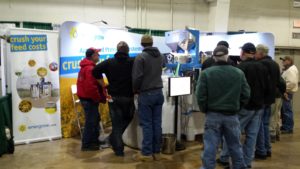 Constant crowds around the on-farm soy meal and oil processor
Constant crowds around the on-farm soy meal and oil processor
Being near Lancaster County, Pennsylvania, the Keystone Farm Show serves a strong large scale organic farming industry with the significant number of Amish and Mennonite communities in the region. We've always had sophisticated inquiries about getting involved with bioenergy and biofuels from organic farmers who see potential opportunities for woody areas and lands that aren't good for producing higher value products. Some are also just exploring potential options.
Tobacco and Hemp
One group of young men mused about "doing something else" with their tobacco. I could tell them about research on tobacco related to biofuels feedstock. Another group wondered about hemp, initiating a conversation that encompassed understanding that nothing that has greater value would be used to make fuel; the economics work against it. So, hemp is more likely useful for fibers than fuel; unless there are great quantities of seeds for oil. That other hemp, well, is there any waste that could feed the biofuels industry?
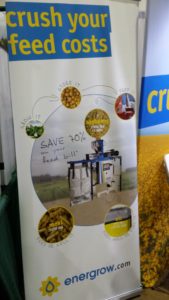 Crush your soy meal costs and make fuel from the remaining oil
Crush your soy meal costs and make fuel from the remaining oil
On-Farm Production of Soy Meal
One of the most unexpected experiences, however, came from Jasmin Hofer's Energrow booth. We had met a couple of years ago and talked about the farm-scale oilseed pressing system equipment she was promoting. What a difference a couple of years makes. A visitor to our booth asked if I had seen the equipment to crush soybeans to make meal for animal feed and oil for fuel.
I thought I'd stop by to say hello. I could barely get close enough to see the equipment she was demonstrating. So, I returned. Again and again. Finally, I gave up and left my card on her chair.
I gave it one last shot as the expo was closing up the second day. I did get a chance to talk briefly with her and a satisfied customer (who would not give me his name, but who agreed to pose for a photo). He was not only buying the basic system; but also the expansion modules and related equipment. He was eagerly anticipating his venture. Growing his own soybeans, he would be able to relatively easily produce his own soy meal for feed for his livestock; and use the oil, straight without converting to biodiesel, in farm vehicles and equipment. He expected to reap significant operational savings.
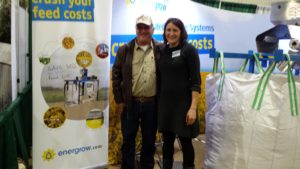 Jasmin Hofer and a satisfied customer at the Energrow demonstration
Jasmin Hofer and a satisfied customer at the Energrow demonstration
One other characteristic of Jasmin Hofer's business, that it is foreign (Canadian) bears notice. Over the years, more and more farm equipment innovations seem to be coming from other countries. Like a suffering canary in a coal mine, the decreased space used by American companies like New Holland, John Deere, Case/International Harvester, etc., at the expo signals a problem. Scandinavian, German, Italian, Polish. Equipment from Europe is finding a home in the US.
From informal conversations, I discerned another characteristic the representatives of those companies share with Hofer. Many are young professionals who do not feel stuck in a job; who are not working just for a paycheck; who have an entrepreneurial spirit, but not one that sees making money as the greatest or only measure of their self-worth. They see agriculture as a fun, exciting, forward-looking, morally rewarding, beneficial occupation. Those with young families really see their work as a serious contribution to creating for their children a better world.
Unscientific conclusions, perhaps; but certainly an appreciated tonic during a winter full of bleak news. And a source of motivation to continue our contribution to these shared paths toward a truly renewable sustainable energy and economic future.
For an idea of what I'm talking about, take a look at the American Harvest videos.
*Joanne Ivancic, serves as Executive Director of Advanced Biofuels USA.
Nearly 55,000 articles in our online library!
Use the categories and tags listed below to access the nearly 50,000 articles indexed on this website.
Advanced Biofuels USA Policy Statements and Handouts!
- For Kids: Carbon Cycle Puzzle Page
- Why Ethanol? Why E85?
- Just A Minute 3-5 Minute Educational Videos
- 30/30 Online Presentations
- “Disappearing” Carbon Tax for Non-Renewable Fuels
- What’s the Difference between Biodiesel and Renewable (Green) Diesel? 2020 revision
- How to De-Fossilize Your Fleet: Suggestions for Fleet Managers Working on Sustainability Programs
- New Engine Technologies Could Produce Similar Mileage for All Ethanol Fuel Mixtures
- Action Plan for a Sustainable Advanced Biofuel Economy
- The Interaction of the Clean Air Act, California’s CAA Waiver, Corporate Average Fuel Economy Standards, Renewable Fuel Standards and California’s Low Carbon Fuel Standard
- Latest Data on Fuel Mileage and GHG Benefits of E30
- What Can I Do?
Donate
DonateARCHIVES
- July 2025
- June 2025
- May 2025
- April 2025
- March 2025
- February 2025
- January 2025
- December 2024
- November 2024
- October 2024
- September 2024
- August 2024
- July 2024
- June 2024
- May 2024
- April 2024
- March 2024
- February 2024
- January 2024
- December 2023
- November 2023
- October 2023
- September 2023
- August 2023
- July 2023
- June 2023
- May 2023
- April 2023
- March 2023
- February 2023
- January 2023
- December 2022
- November 2022
- October 2022
- September 2022
- August 2022
- July 2022
- June 2022
- May 2022
- April 2022
- March 2022
- February 2022
- January 2022
- December 2021
- November 2021
- October 2021
- September 2021
- August 2021
- July 2021
- June 2021
- May 2021
- April 2021
- March 2021
- February 2021
- January 2021
- December 2020
- November 2020
- October 2020
- September 2020
- August 2020
- July 2020
- June 2020
- May 2020
- April 2020
- March 2020
- February 2020
- January 2020
- December 2019
- November 2019
- October 2019
- September 2019
- August 2019
- July 2019
- June 2019
- May 2019
- April 2019
- March 2019
- February 2019
- January 2019
- December 2018
- November 2018
- October 2018
- September 2018
- August 2018
- July 2018
- June 2018
- May 2018
- April 2018
- March 2018
- February 2018
- January 2018
- December 2017
- November 2017
- October 2017
- September 2017
- August 2017
- July 2017
- June 2017
- May 2017
- April 2017
- March 2017
- February 2017
- January 2017
- December 2016
- November 2016
- October 2016
- September 2016
- August 2016
- July 2016
- June 2016
- May 2016
- April 2016
- March 2016
- February 2016
- January 2016
- December 2015
- November 2015
- October 2015
- September 2015
- August 2015
- July 2015
- June 2015
- May 2015
- April 2015
- March 2015
- February 2015
- January 2015
- December 2014
- November 2014
- October 2014
- September 2014
- August 2014
- July 2014
- June 2014
- May 2014
- April 2014
- March 2014
- February 2014
- January 2014
- December 2013
- November 2013
- October 2013
- September 2013
- August 2013
- July 2013
- June 2013
- May 2013
- April 2013
- March 2013
- February 2013
- January 2013
- December 2012
- November 2012
- October 2012
- September 2012
- August 2012
- July 2012
- June 2012
- May 2012
- April 2012
- March 2012
- February 2012
- January 2012
- December 2011
- November 2011
- October 2011
- September 2011
- August 2011
- July 2011
- June 2011
- May 2011
- April 2011
- March 2011
- February 2011
- January 2011
- December 2010
- November 2010
- October 2010
- September 2010
- August 2010
- July 2010
- June 2010
- May 2010
- April 2010
- March 2010
- February 2010
- January 2010
- December 2009
- November 2009
- October 2009
- September 2009
- August 2009
- July 2009
- June 2009
- May 2009
- April 2009
- March 2009
- February 2009
- January 2009
- December 2008
- November 2008
- October 2008
- September 2008
- August 2008
- July 2008
- June 2008
- May 2008
- April 2008
- March 2008
- February 2008
- January 2008
- December 2007
- November 2007
- October 2007
- September 2007
- August 2007
- June 2007
- February 2007
- January 2007
- October 2006
- April 2006
- January 2006
- April 2005
- December 2004
- November 2004
- December 1987
CATEGORIES
- About Us
- Advanced Biofuels Call to Action
- Aviation Fuel/Sustainable Aviation Fuel (SAF)
- BioChemicals/Renewable Chemicals
- BioRefineries/Renewable Fuel Production
- Business News/Analysis
- Cooking Fuel
- Education
- 30/30 Online Presentations
- Competitions, Contests
- Earth Day 2021
- Earth Day 2022
- Earth Day 2023
- Earth Day 2024
- Earth Day 2025
- Executive Training
- Featured Study Programs
- Instagram TikTok Short Videos
- Internships
- Just a Minute
- K-12 Activities
- Mechanics training
- Online Courses
- Podcasts
- Scholarships/Fellowships
- Teacher Resources
- Technical Training
- Technician Training
- University/College Programs
- Events
- Coming Events
- Completed Events
- More Coming Events
- Requests for Speakers, Presentations, Posters
- Requests for Speakers, Presentations, Posters Completed
- Webinars/Online
- Webinars/Online Completed; often available on-demand
- Federal Agency/Executive Branch
- Agency for International Development (USAID)
- Agriculture (USDA)
- Commerce Department
- Commodity Futures Trading Commission
- Congressional Budget Office
- Defense (DOD)
- Air Force
- Army
- DARPA (Defense Advance Research Projects Agency)
- Defense Logistics Agency
- Marines
- Navy
- Education Department
- Energy (DOE)
- Environmental Protection Agency
- Federal Energy Regulatory Commission (FERC)
- Federal Reserve System
- Federal Trade Commission
- Food and Drug Administration
- General Services Administration
- Government Accountability Office (GAO)
- Health and Human Services (HHS)
- Homeland Security
- Housing and Urban Development (HUD)
- Interior Department
- International Trade Commission
- Joint Office of Energy and Transportation
- Justice (DOJ)
- Labor Department
- National Academies of Sciences Engineering Medicine
- National Aeronautics and Space Administration
- National Oceanic and Atmospheric Administration
- National Research Council
- National Science Foundation
- National Transportation Safety Board (NTSB)
- Occupational Safety and Health Administration
- Overseas Private Investment Corporation
- Patent and Trademark Office
- Securities and Exchange Commission
- State Department
- Surface Transportation Board
- Transportation (DOT)
- Federal Aviation Administration
- National Highway Traffic Safety Administration (NHTSA)
- Pipeline and Hazardous Materials Safety Admin (PHMSA)
- Treasury Department
- U.S. Trade Representative (USTR)
- White House
- Federal Legislation
- Federal Litigation
- Federal Regulation
- Feedstocks
- Agriculture/Food Processing Residues nonfield crop
- Alcohol/Ethanol/Isobutanol
- Algae/Other Aquatic Organisms/Seaweed
- Atmosphere
- Carbon Dioxide (CO2)
- Field/Orchard/Plantation Crops/Residues
- Forestry/Wood/Residues/Waste
- hydrogen
- Manure
- Methane/Biogas
- methanol/bio-/renewable methanol
- Not Agriculture
- RFNBO (Renewable Fuels of Non-Biological Origin)
- Seawater
- Sugars
- water
- Funding/Financing/Investing
- grants
- Green Jobs
- Green Racing
- Health Concerns/Benefits
- Heating Oil/Fuel
- History of Advanced Biofuels
- Infrastructure
- Aggregation
- Biofuels Engine Design
- Biorefinery/Fuel Production Infrastructure
- Carbon Capture/Storage/Use
- certification
- Deliver Dispense
- Farming/Growing
- Precursors/Biointermediates
- Preprocessing
- Pretreatment
- Terminals Transport Pipelines
- International
- Abu Dhabi
- Afghanistan
- Africa
- Albania
- Algeria
- Angola
- Antarctica
- Arctic
- Argentina
- Armenia
- Aruba
- Asia
- Asia Pacific
- Australia
- Austria
- Azerbaijan
- Bahamas
- Bahrain
- Bangladesh
- Barbados
- Belarus
- Belgium
- Belize
- Benin
- Bermuda
- Bhutan
- Bolivia
- Bosnia and Herzegovina
- Botswana
- Brazil
- Brunei
- Bulgaria
- Burkina Faso
- Burundi
- Cambodia
- Cameroon
- Canada
- Caribbean
- Central African Republic
- Central America
- Chad
- Chile
- China
- Colombia
- Congo
- Congo, Democratic Republic of
- Costa Rica
- Croatia
- Cuba
- Cyprus
- Czech Republic
- Denmark
- Dominican Republic
- Dubai
- Ecuador
- El Salvador
- Equatorial Guinea
- Eqypt
- Estonia
- Eswatini/Swaziland
- Ethiopia
- European Union (EU)
- Fiji
- Finland
- France
- French Guiana
- Gabon
- Georgia
- Germany
- Ghana
- Global South
- Greece
- Greenland
- Grenada
- Guatemala
- Guinea
- Guyana
- Haiti
- Honduras
- Hong Kong
- Hungary
- Iceland
- India
- Indonesia
- Iran
- Iraq
- Ireland
- Israel
- Italy
- Ivory Coast
- Jamaica
- Japan
- Jersey
- Jordan
- Kazakhstan
- Kenya
- Korea
- Kosovo
- Kuwait
- Laos
- Latin America
- Latvia
- Lebanon
- Liberia
- Lithuania
- Luxembourg
- Macedonia
- Madagascar
- Malawi
- Malaysia
- Maldives
- Mali
- Malta
- Marshall Islands
- Mauritania
- Mauritius
- Mexico
- Middle East
- Moldova
- Monaco
- Mongolia
- Morocco
- Mozambique
- Myanmar/Burma
- Namibia
- Nepal
- Netherlands
- New Guinea
- New Zealand
- Nicaragua
- Niger
- Nigeria
- North Africa
- North America
- North Korea
- Northern Ireland
- Norway
- Oman
- Pakistan
- Panama
- Papua New Guinea
- Paraguay
- Peru
- Philippines
- Poland
- Portugal
- Qatar
- Republic of
- Romania
- Russia
- Rwanda
- Saudi Arabia
- Scotland
- Senegal
- Serbia
- Sierra Leone
- Singapore
- Slovakia
- Slovenia
- Solomon Islands
- South Africa
- South America
- South Korea
- South Sudan
- Southeast Asia
- Spain
- Sri Lanka
- Sudan
- Suriname
- Sweden
- Switzerland
- Taiwan
- Tanzania
- Thailand
- Timor-Leste
- Togo
- Trinidad and Tobago
- Tunisia
- Turkey
- Uganda
- UK (United Kingdom)
- Ukraine
- United Arab Emirates UAE
- Uruguay
- Uzbekistan
- Vatican
- Venezuela
- Vietnam
- Wales
- Zambia
- Zanzibar
- Zimbabwe
- Marine/Boat Bio and Renewable Fuel/MGO/MDO/SMF
- Marketing/Market Forces and Sales
- Opinions
- Organizations
- Original Writing, Opinions Advanced Biofuels USA
- Policy
- Presentations
- Biofuels Digest Conferences
- DOE Conferences
- Bioeconomy 2017
- Bioenergy2015
- Biomass2008
- Biomass2009
- Biomass2010
- Biomass2011
- Biomass2012
- Biomass2013
- Biomass2014
- DOE Project Peer Review
- Other Conferences/Events
- R & D Focus
- Carbon Capture/Storage/Use
- Co-Products
- Feedstock
- Logistics
- Performance
- Process
- Vehicle/Engine/Motor/Aircraft/Boiler
- Yeast
- Railroad/Train/Locomotive Fuel
- Resources
- Books Web Sites etc
- Business
- Definition of Advanced Biofuels
- Find Stuff
- Government Resources
- Scientific Resources
- Technical Resources
- Tools/Decision-Making
- Rocket/Missile Fuel
- Sponsors
- States
- Alabama
- Alaska
- Arizona
- Arkansas
- California
- Colorado
- Connecticut
- Delaware
- Florida
- Georgia
- Hawai'i
- Idaho
- Illinois
- Indiana
- Iowa
- Kansas
- Kentucky
- Louisiana
- Maine
- Maryland
- Massachusetts
- Michigan
- Midwest
- Minnesota
- Mississippi
- Missouri
- Montana
- Native American tribal nation lands
- Nebraska
- Nevada
- New Hampshire
- New Jersey
- New Mexico
- New York
- North Carolina
- North Dakota
- Ohio
- Oklahoma
- Oregon
- Pennsylvania
- Puerto Rico
- Rhode Island
- South Carolina
- South Dakota
- Tennessee
- Texas
- Utah
- Vermont
- Virginia
- Washington
- Washington DC
- West Coast
- West Virginia
- Wisconsin
- Wyoming
- Sustainability
- Uncategorized
- What You Can Do
tags
© 2008-2023 Copyright Advanced BioFuels USA. All Rights reserved.
.jpg)





0 COMMENTS
Leave A Comment
Your Email Address wiil not be Published. Required Field Are marked*